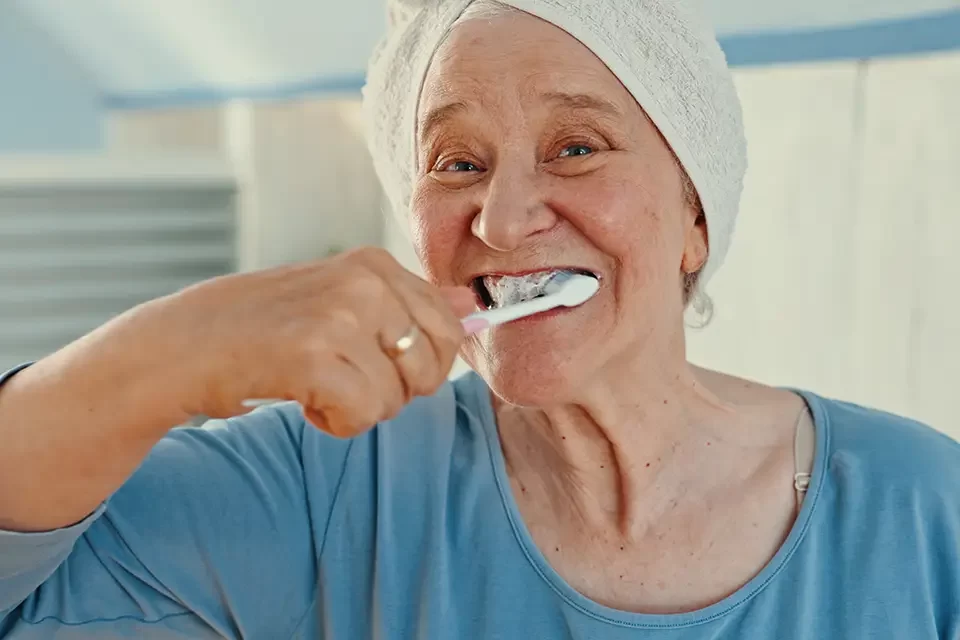Introduction: Why Senior Oral Health Deserves Extra Focus
Teeth don’t stop working as we age. They chew, grind, and absorb pressure day after day — and after decades, they show it. Enamel thins. Gums pull back. Fillings that once felt solid may loosen. Add in medications that dry the mouth, and the risk of cavities goes up.
This is why dental care for seniors isn’t just a repeat of earlier routines. It requires adjustments, sometimes big ones. At FIFTH ST Dental in Etobicoke, we meet seniors who want to eat without pain, keep dentures comfortable, and prevent small problems from becoming big ones. With the right care, it’s possible to protect both oral health and overall wellbeing well into later life.
Why Are Regular Dental Visits Essential for Seniors?
It’s easy to assume fewer visits are needed once you’re older. That assumption can be costly. Cavities can hide under crowns or fillings. Gum disease doesn’t always hurt until it’s advanced. Oral cancers become more common with age.
One gentleman in his late seventies came to us only because his denture felt loose. That single visit uncovered gum inflammation that could have developed into something more serious. And that’s why routine visits remain the backbone of dental care for seniors.
Dental Care for Seniors: Home Habits
Everyday care matters. The basics don’t change, but the tools often do.
- Soft-bristled Brushes: Kinder on gums that may already be delicate.
- Fluoride Toothpaste: Protects exposed roots and reinforces enamel.
- Alternative Flossing Tools: Floss picks, interdental brushes, or water flossers help when arthritis makes string flossing harder.
- Consistency: Twice-daily brushing and once-daily interdental cleaning remain the baseline.
We remind patients that dental care for seniors is not about complicated steps. It’s about doing the basics consistently, with the right tools.
What Role Do Nutrition and Hydration Play?
Diet affects oral health more than many realize. Seniors often cut back on harder foods — apples, nuts, or crisp vegetables — because chewing is difficult. In doing so, they may lose nutrients that teeth and gums need to stay strong.
- Balanced Diet: Adequate protein, calcium, and vitamins are essential for bone and gum health.
- Sugar Control: Dry mouth, often caused by medications, makes sugar more damaging. Even small, frequent amounts can increase cavity risk.
- Hydration: Water replaces saliva’s protective role, but it’s easy to overlook. Patients who drink tea or coffee all day often develop more cavities than expected.
This shows how tightly dental care for seniors is linked to diet and daily choices.

Dental Care for Seniors: Common Problems Seniors Face
Certain conditions repeat across older patients:
- Dry Mouth: Often caused by medication. It makes chewing harder and cavities easier to develop.
- Gum Disease: Still the leading cause of tooth loss. Often painless until it’s advanced.
- Tooth Wear and Fractures: Enamel thins over the decades, leading to cracks or breaks.
- Oral cancer: Risk increases with age. Early stages are often symptom-free, which is why screening matters.
These are not rare events. They are the daily reality of senior oral health, and they explain why consistent dental care for seniors is non-negotiable.
Restorative Solutions for Missing Teeth
Tooth loss doesn’t have to mean losing independence. There are several proven restorative paths:
- Full Dentures: Replace every tooth when needed.
- Partial Dentures: Fill gaps while preserving natural teeth.
- Implant-supported Restorations: Provide stability and protect the jawbone.
We’ve seen patients regain not just chewing function, but the confidence to join social meals again. Restorative options are an essential branch of dental care for seniors.
Dental Care for Seniors: Prevention Tips
Prevention isn’t only about brushing and flossing. Wider measures matter:
- Routine Screenings: Detect issues like gum disease or oral cancer early.
- Quit Smoking: Tobacco accelerates gum problems and raises cancer risk.
- Manage Overall Health: Diabetes, osteoporosis, and heart disease often show early signs in the mouth.
That’s why dental care for seniors is best viewed as part of whole-body health.
FIFTH ST Dental's Approach
No two seniors share the same dental story. Some have decades of crowns and fillings, others have dentures, and many juggle medications that change how the mouth feels every day.
At FIFTH ST Dental in Etobicoke, we adapt to each patient’s needs. Some require simpler hygiene tools. Others need restorative treatment. Many benefit from longer appointments with more discussion. In every case, the goal is the same: comfort, function, and confidence.

Conclusion: Why Senior Dental Health Shouldn't Wait
Oral health is not just about teeth. It’s about eating comfortably, avoiding infection, and staying independent. Seniors who keep up with regular visits and simple home care preserve more than their smile — they protect their quality of life.
At FIFTH ST Dental in Etobicoke, we view dental care for seniors as essential to overall wellbeing. The earlier attention begins, the better the results — but it’s never too late to take action.
If you or someone close to you is thinking about senior dental health, we’re here to help. Contact FIFTH ST Dental to discuss your needs. Together, we’ll build a practical plan for dental care for seniors that fits your situation and helps you stay healthy, comfortable, and confident.
FAQs: Dental Care for Seniors
Do seniors in Canada get free dental care?
Not across the board. Some provinces, like Ontario, have programs for low-income seniors that cover basics such as check-ups, fillings, or dentures. But it’s not full coverage for everyone.
At what age do dental benefits stop for seniors?
There isn’t one national cut-off. In Ontario, the senior program begins at 65, but eligibility also depends on income. Other provinces set their own rules.
How do seniors apply for government dental coverage?
In Ontario, most start with their local public health unit. It involves some paperwork — proof of age, income, and residency. Once approved, you’re directed to a participating clinic.
What's the difference between the Canadian Dental Care Plan and Ontario's senior plan?
The federal plan is broad and new, meant for Canadians across age groups. Ontario’s program is provincial, only for residents 65 and older with limited income. One is wide in scope; the other is very specific.





